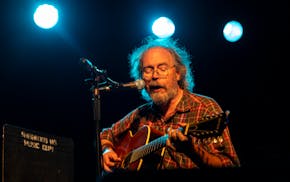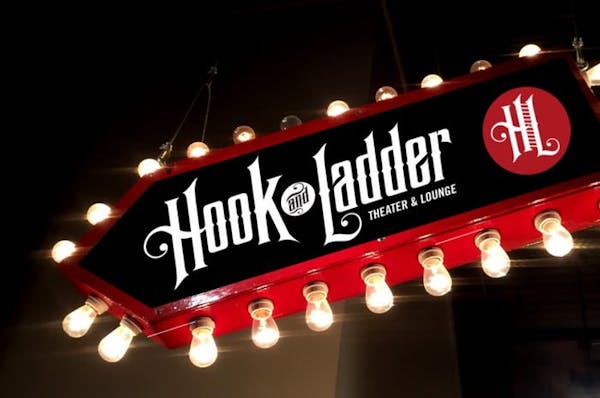By the time the Okee Dokee Brothers got to see Pete Seeger perform in Woodstock, N.Y., in 2011, the folk legend was 91 and not in the best of health. Which made an even bigger impression on them.
"He had a banjo in his hand and barely plucked it," Okee Dokee banjoist Justin Lansing recalled, "but all he had to do was raise his hands and say some words and we all knew what to sing.
"It was such an inspiration for us about the simple power of getting people to sing together."
For Lansing and Joe Mailander — who've been singing together since childhood — now more than ever is the time to channel that power.
While many other Grammy-winning acts are delaying their album releases until they can get back on the road after the coronavirus lockdown, the kid-friendly Twin Cities folk duo has hurried up the release of their new album by two months. They figured their core audience could use it right now.
"Instead of worrying about touring, we decided it was more important right now to meet quarantined families where they are: stuck at home," explained Mailander.
"Hopefully, these songs can lend them some hope, lift some spirits, or simply give them something to do together. It ties into the whole idea of these being songs to celebrate togetherness."
Titled "Songs for Singin'," the two-disc collection was largely inspired by the call-and-response brand of folk music revolutionized by Seeger and the original "Okie" song man, Woody Guthrie. It's interactive folk that even the most novice singers and musicians can join in on.
"Songs for Singin' " marks a deviation from the Okee Dokees' "adventure" records of the past, including 2018's "Winterland" and their 2012 breakthrough "Can You Canoe?," which won them a Grammy for best kids music album.
Whereas those LPs grew out of specific outdoor activities — i.e., "Canoe" was famously based on a floating trip down the Mississippi River — this one really steps back and focuses on a more basic pastime: singing. Physical copies even come with a book of lyrics and chords for accompaniment.
In a joint interview via Zoom last week while they each were stuck in their respective homes — Mailander in Minneapolis and Lansing in Denver — the Okee Dokees went so far as to call this their "most universal record yet."
"Not every kid out there can go ride a horse or climb in a canoe, but most of them can sing these songs," Lansing explained.
'Simple little songs'
A lot of the tracks, including the album opener "Hope Machine," "Jubilation" and "Neighborhood Band" (recorded with help from some of Mailander's real-life neighbors), really are just about the joys and communal properties of singing. Others offer a singalong approach to daily family routines, including "Early Bird," "Afternoon Walk and "Hushabye," and many were inspired by Mailander's own full days with his toddler son, Hap. Hence the two discs being split into "Day" and "Night" themes.
Meanwhile, some of the more random "Songs for Singin' " include "Shelly-O," inspired by avid sailor Seeger's boat songs; "Church of the Woods," about the musicality of nature; and "Singin' for Me Supper," an adaptation of the traditional Irish folk song "All for Me Grog."
"The original is about drinking beer and leaving your wife, so we had to put our own twist on it," quipped Mailander, who has taken a few trips to Ireland with his fellow Irish-American wife, Allison.
"Every night you can go to a pub to hear some kind of community music performance, whether it's a traditional Irish music jam or these kind of sea shanties and other songs everyone sings along to. That was a big inspiration, too."
This album definitely has a more American side, though. The Okee Dokees refrain from the political messaging of Seeger's and Guthrie's music; just hinting at the dangers of global warming on their last album, "Winterland," put them on thin ice in some listeners' minds. (On the upside, the record also earned them another Grammy nomination.) If anything, they said, they wanted to emphasize the commonality of old folk music in these new songs.
"Pete and Woody really found a common bond between left and right," Mailander said. "They did have some pretty radical thoughts but connected to and spoke for the working class in a way that speaks to the political divide at the moment, especially in this pandemic."
Added Lansing, "One of Pete's main theories was the very simple idea that if we get together and sing together, we'll start hearing each other better."
Of course, it's going to be a while before fans can hear the Okee Dokees sing in person. The duo had a hometown release party planned for late June that's yet to be announced, and it maybe won't be, pending stay-at-home guidelines.
Whenever they do get back on the road, the duo expects to have a renewed sense of importance for what they called their "simple little songs."
"We don't have huge anthemic ballads like U2," Mailander said, "but in our own little way I feel like what we do reminds us how important it is to be together and connect through music."

Critics' picks: The 11 best things to hear, do and see in the Twin Cities this week

Critics' picks: The 9 best things to do and see in the Twin Cities this week

The 5 best things our food writers ate this week

The 5 best things our food writers ate this week

